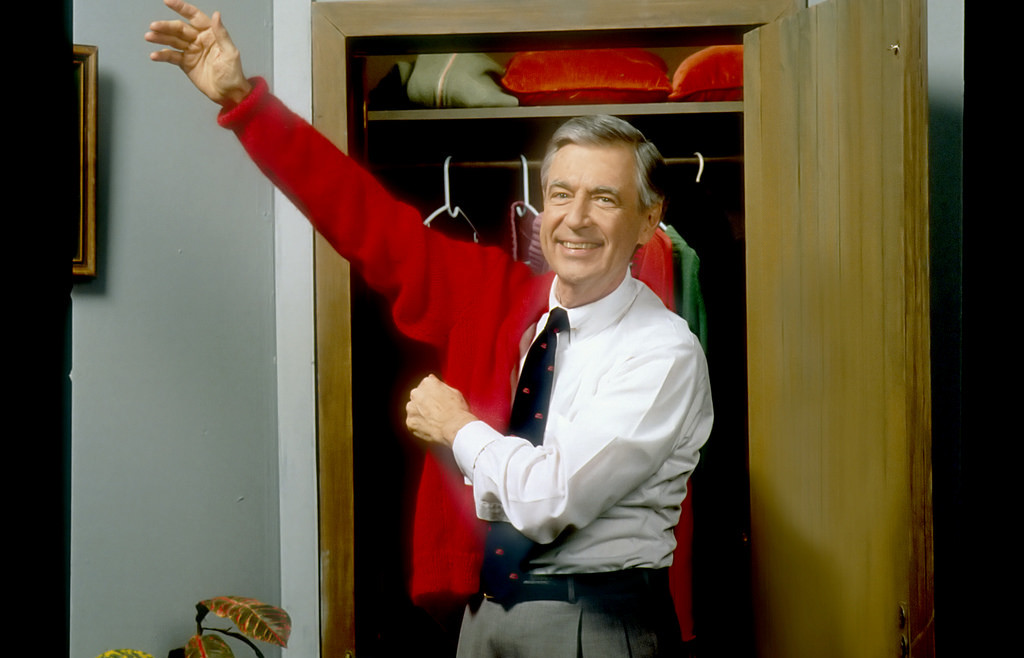“You are a special person. Just because you’re you”
-personal correspondence to Sam Golden (with permission) from Mr. Rogers
November, 1997
“Too often we underestimate the power of a touch, a smile, a kind word, a listening ear, an honest compliment, or the smallest act of caring, all of which have the potential to turn a life around.”
― Leo F. Buscaglia
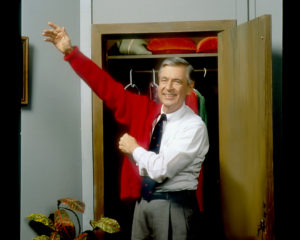
Have you ever been brought close to tears when you have received compassion from another person?
In a previous post, I shared Mr. Rogers’ precious personal gift of compassion. I was feeling sadness and loss about leaving my young son Sam when I was returning to work.
Many readers told me how Fred Rogers’ words helped them, too.
Revisiting and sharing the solace I received has been impetus to highlight further insights about compassion.
When we give and receive compassion, our hearts share the following:
I see you.
I hear you.
I understand your feelings; your joy, and your suffering.
I recognize that you have a sacred light within you.
Your essence is of innate value.
May my words or deeds support you.
In the example of Fred Rogers, he made precious time to write a genuinely personal letter in response to my sadness, to indeed help from afar through a difficult time.
Several years later our son Sam was drawn to write his own letter to Mr. Rogers(see below).
Compassion as Relationship, Compassion as Action
Compassion arises from the realization that although we are separate beings, we are very much connected to each other. Through studies of Mussar, my spiritual partner Louise and I explored the soul-trait of compassion in great depth .
Mussar teacher Dr. Alan Morinis in his book Everyday Holiness states that one way to understand compassion is its opposite:
“Aloofness-with its sense of being remote and distant-is inimical to compassion”.
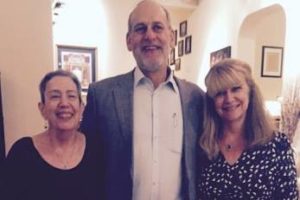
Dr. Morinis goes on to write that “The soul trait of compassion may be more accurately defined as touching another being so closely…that you no longer perceive the other one as separate from you”. Dr. Morinis writes that our emotional connection must be translated into action.
Fred Rogers not only preached compassion, he took action by responding compassionately to my feelings through personal correspondence.
And of course he took compassionate action on behalf of millions of children through his television show.
Simply being heard and provided nonjudgmental space to share the range of human emotions in a challenging situation is quite healing, don’t you think? And often compassionate listening is enough action.
I deeply belief that the rare gift of being heard and understood is profound and healing.
Often, compassionate action beyond listening must take place on behalf of another. Particularly when helping those less fortunate than ourselves.
Compassion as Shared Joy
Have you felt a little sad, hurt, or ignored because a friend/colleague/relative seems unable to celebrate your joy or success? This is an example of withheld compassion.
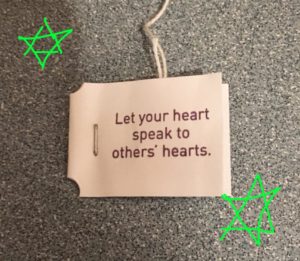
If we view compassionate action as a specific expression of shared happiness, then we can broaden our understanding.
It has been a privilege to study directly on several meditation retreats over the years with Sharon Salzberg. In her 1997 classic book Heart as Wide as the World, Sharon says:
“We often think of compassion as being brought forth by seeing suffering-certainly that’s true. But there is also a quality of compassion, a feeling of deep connection that arises from rejoicing.”
The capacity to open one’s heart to sharing and connecting with another’s happiness is an oft overlooked dimension of compassion.
Mr. Rogers: Communicating Compassion as Joy
Our son Sam wrote a letter in 1997 to Mr. Rogers. He was only eight years old.
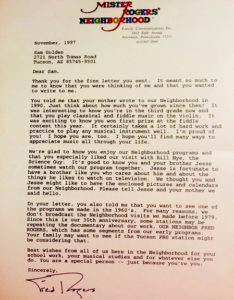
And Mr. Rogers personally wrote back to Sam. In this letter, Fred Rogers beautifully communicated compassionate joy and pride in Sam.
He also encouraged Sam to be proud of himself .
Sam is now a professional musician and composer. I can’t help but believe that although he never met Fred Rogers in person, Mr. Rogers was one of Sam’s musical influences.
With Sam’s permission, here is a portion of the letter to Sam from Fred Rogers:
“Thank you for the fine letter you sent. It meant so much to me to know that you were thinking of me and that you wanted to write to me. “
“You told me that your mother wrote to our Neighborhood in 1990. Just think how much you’ve grown since then! It was interesting to know you’re in the third grade now and that you play classical and fiddle music on the violin. It was exciting to know you won first prize at the fiddle contest this year. It certainly takes a lot of hard work and practice to play any musical instrument well. I’m proud of you! I hope you are too. I hope you’ll find many ways to appreciate music all through your life”.
“It’s good to know you and your brother Jesse sometimes watch our
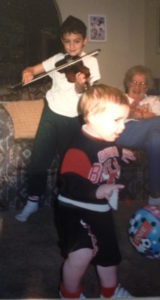
program together. Jesse is fortunate to have a brother like you who cares about him and about the things he likes to watch on television…Please tell Jesse and your mother we say hello.”
“Best wishes from all of us here in the Neighborhood for your school work, your musical studies and for whatever else you do. You are a special person – just because you’re you”.
Compassion for Self, Compassion for others
The cliché from air travel “put on your oxygen mask first” in order to be able to take care those who depend on you can be applied to the concept of self-care, or self compassion.
Sometimes I feel sad, anxious, vulnerable, or disappointed in my physical body because of an injury. Other times I need to set boundaries in order to conserve my own time and energy.
At these times I must practice self-compassion.
Kristin Neff, PhD has written and researched extensively about this practice. I have written extensively and published books about self-care and self-esteem which are related concepts. My professional training and personal practice has always included mindfulness of self-talk.
In my classes, I have been offering variations of self-compassion affirmations and meditations such as:
“I send compassion to my heart”.
“May I travel through life with self-care”
“Sending kindness to myself.”
Won’t you take a breath and send compassion to yourself now?
We looking forward to seeing you in upcoming
classes and workshops.
Resources in addition to those linked above:
Kristin Neff’s Resource List
Stanford Center for Compassion and Altruism.

